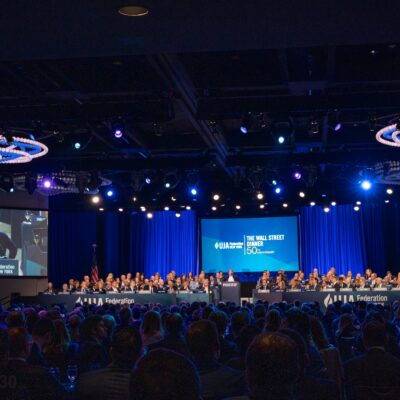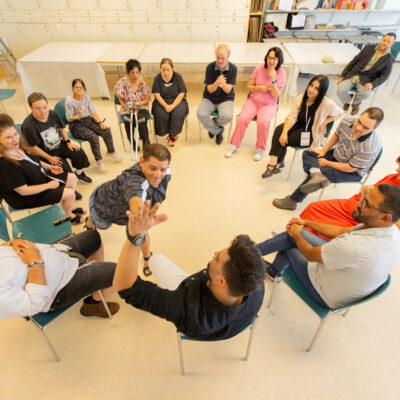Jewish Camp as an Incubator for Culture Change
[This article appears as part of a series presented by the SafetyRespectEquity Coalition about the work of Jewish organizations to prevent and address sexual harassment and gender discrimination. By pulling back the curtain on works in progress, the Coalition hopes to inspire others to begin their own crucial reform efforts. You can read the framing piece here.]

By Jeremy J. Fingerman
Jewish summer camp is a laboratory for the Jewish community and an incubator for the Jewish future. What happens at camp does not and should not stay at camp. What happens at camp does and should influence Jewish life and leadership.
Indeed, Jewish camp professionals have the unique privilege and sacred responsibility of imparting the values and shaping the culture that campers will carry with them as they become adults, parents and leaders in our community.
For this reason, Foundation for Jewish Camp (FJC) is honored to be a member organization of the SafetyRespectEquity (SRE) Coalition, and I am proud to serve on its Stewardship Committee. We know our community is at the dawn of a critical and long overdue shift on the issues of harassment and discrimination – and we believe that summer camp has an integral role to play in incubating change.
To this end, last March FJC embarked on our Shmira Initiative to help camps proactively evaluate and take the initial steps toward culture change on all levels, which includes implementing a shift in training, policy, staff programming and enforcement around issues of gender, sex and power. The work of supporting camp professionals in changing camp culture is essential to ensuring positive camp experiences and to promoting a more expansive year-round culture built on the fundamental values of safety, consent and respect.
Let me state with the utmost humility that we have only just begun this work. We envision a day when camps will serve as an effective and influential model on this front, but we want to emphasize that an evolving and iterative road lies ahead. Culture change, in particular, involves persistent effort and a very long runway. Moving forward, our Jewish values will continue to serve as our North Star, helping us to work toward a safer and more respectful future for all.
In the meantime, I would like to share three tangible steps that FJC has taken in pursuit of the highly crucial yet notoriously abstract concept of culture change.
First, last spring and in partnership with Moving Traditions, we organized three regional trainings. The sessions provided more than 120 camps and organizations with up-to-date tools and methods for camp professionals and staff to use to ensure the safety of their team and their campers. We are currently evaluating feedback from the field, which will help us to prioritize additional resources and guidance we can provide camps in advance of the 2019 summer season. Among them, we plan to release resources to help camps initiate conversations around building healthy relationships and exploring how campers and staff “show up” for one another.
Second, we took steps to ensure that our own house is in order. We began by providing supervisors and staff on the FJC professional team with training guided by nationally-recognized expert Fran Sepler about how to prevent and respond to sexual harassment and discrimination, and to address general workplace culture. In advance of changes in New York state law, we also updated the policies and procedures in our employee handbook to reflect the seriousness of our commitment to a safe and respectful workplace. We are committed to securing the mechanisms for addressing unwanted sexual advances, and therefore helping everyone on our team to feel safe and supported in reporting complaints.
Third, we sought the affirmation and compliance of our Board of Directors. While every year each of our board members sign Code of Ethics, Conflict of Interest and Whistleblower policies, we realized we did not have a specific policy for our board regarding harassment and discrimination. This led us to develop a new anti-harassment policy, with the help of outside legal counsel, which included a codified reporting and notification process. Our board adopted the new policy unanimously at its July board meeting.
We are now encouraging camping movements, hosting institutions and individual camps – each of which are separate 501(c)3 organizations – to embark on a similar process.
Notably, a healthy camp culture also requires a steadfast commitment to child safety. We are proud to have partnered with the American Camp Association in advocating for the successful passage of the Child Protection Improvements Act, signed into law by the President in April. The legislation gives camp professionals access to the national FBI background check database, which they can use to screen seasonal applicants for camps and other organizations serving young people.
I admire the commitment of the Jewish communal organizations participating in the SRE Coalition. We all have a responsibility to help create safe, nurturing environments for our community members. I know that moving forward we will continue to learn from each other, to raise the profile of these critical issues and actively refine best practices for addressing them. Much work remains, but it is imperative that we take the first steps toward shaping the world in which we aspire to live, a world that truly embodies the Jewish values of safety, respect and equity for all.
Together, we can set the tone for contemporary Jewish life – for today and tomorrow.
Jeremy J. Fingerman is the Chief Executive Officer of Foundation for Jewish Camp.

 Add EJP on Google
Add EJP on Google









